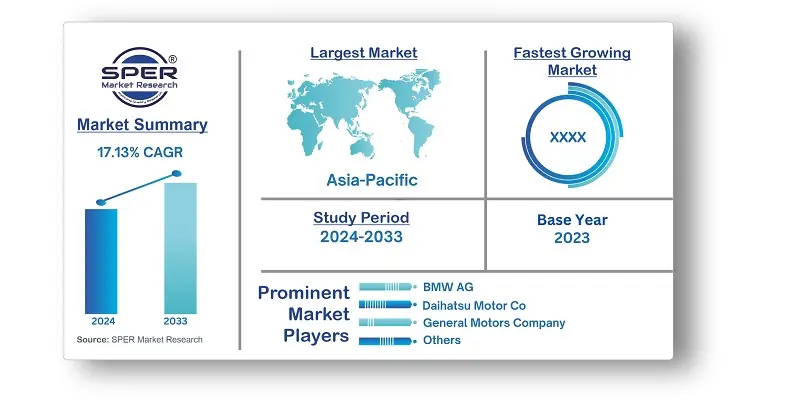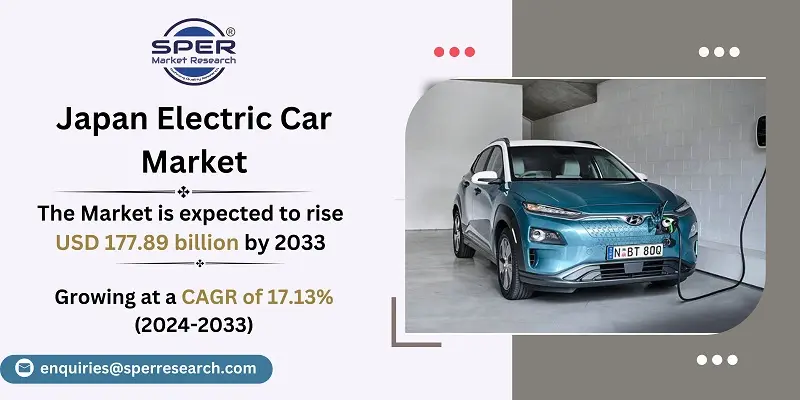
Japan Electric Car Market Growth, Size, Trends, Share, Revenue, Demand and Future Competition
Japan Electric Car Market Size- By Body Type, By Fuel Type- Regional Outlook, Competitive Strategies and Segment Forecast to 2033
| Published: Apr-2024 | Report ID: AMIN24115 | Pages: 1 - 105 | Formats*: |
| Category : Automotive & Transportation | |||


| Report Metric | Details |
| Market size available for years | 2020-2033 |
| Base year considered | 2023 |
| Forecast period | 2024-2033 |
| Segments covered | By Body Type, By Fuel Type |
| Regions covered | Eastern, Western, Northern, Southern |
| Companies Covered | BMW AG, Daihatsu Motor Co., Ltd., General Motors Company, Hino Motors, Ltd., Honda Motor Company, Ltd., Isuzu Motors Ltd., Mazda Motor Corporation, Mitsubishi Fuso Truck and Bus Corporation, Mitsubishi Motors Corporation, Nissan Motor Co., Ltd., Suzuki Motor Corporation, Tesla Inc. |
- Consumer Demographics
- Environmental Advocates
- Urban Dwellers
- Technology Enthusiasts
- Government Entities
- Fleet Operators
- Energy Sector Players
| By Body Type: |
|
| By Fuel Type: |
|
| By Region: |
|
- Japan Electric Car Market Size (FY’2024-FY’2033)
- Overview of Japan Electric Car Market
- Segmentation of Japan Electric Car Market By Body Type (Passenger Cars, Hatchback, Multi-purpose Vehicle, Sedan, Sports Utility Vehicle)
- Segmentation of Japan Electric Car Market By Fuel Type (BEV, FCEV, HEV, PHEV)
- Problems and Obstacles in Japan Electric Car Market
- Competitive Landscape in the Japan Electric Car Market
- Impact of COVID-19 and Demonetization on Japan Electric Car Market
- Details on Current Investment in Japan Electric Car Market
- Competitive Analysis of Japan Electric Car Market
- Prominent Players in the Japan Electric Car Market
- SWOT Analysis of Japan Electric Car Market
- Japan Electric Car Market Future Outlook and Projections (FY’2024-FY’2033)
- Recommendations from Analyst
1.1. Scope of the report1.2. Market segment analysis
2.1. Research data source2.1.1. Secondary Data2.1.2. Primary Data2.1.3. SPER’s internal database2.1.4. Premium insight from KOL’s2.2. Market size estimation2.2.1. Top-down and Bottom-up approach2.3. Data triangulation
4.1. Driver, Restraint, Opportunity and Challenges analysis4.1.1. Drivers4.1.2. Restraints4.1.3. Opportunities4.1.4. Challenges4.2. COVID-19 Impacts of the Japan Electric Car Market
5.1. SWOT Analysis5.1.1. Strengths5.1.2. Weaknesses5.1.3. Opportunities5.1.4. Threats5.2. PESTEL Analysis5.2.1. Political Landscape5.2.2. Economic Landscape5.2.3. Social Landscape5.2.4. Technological Landscape5.2.5. Environmental Landscape5.2.6. Legal Landscape5.3. PORTER’s Five Forces5.3.1. Bargaining power of suppliers5.3.2. Bargaining power of buyers5.3.3. Threat of Substitute5.3.4. Threat of new entrant5.3.5. Competitive rivalry5.4. Heat Map Analysis
6.1. Japan Electric Car Market Manufacturing Base Distribution, Sales Area, Product Type6.2. Mergers & Acquisitions, Partnerships, Product Launch, and Collaboration in Japan Electric Car Market
7.1. Japan Electric Car Market Value Share and Forecast, By Body Type, 2024-20337.2. Passenger Cars7.2.1. Hatchback7.2.2. Multi-purpose Vehicle7.2.3. Sedan
7.2.4. Sports Utility Vehicle
8.1. Japan Electric Car Market Value Share and Forecast, By Fuel Type, 2024-20338.2. BEV8.3. FCEV8.4. HEV8.5. PHEV
9.1. Japan Electric Car Market Size and Market Share
10.1. Japan Electric Car Market Size and Market Share By Body Type (2020-2026)10.2. Japan Electric Car Market Size and Market Share By Body Type (2027-2033)
11.1. Japan Electric Car Market Size and Market Share By Fuel Type (2020-2026)11.2. Japan Electric Car Market Size and Market Share By Fuel Type (2027-2033)
12.1. Japan Electric Car Market Size and Market Share By Region (2020-2026)12.2. Japan Electric Car Market Size and Market Share By Region (2027-2033)12.3. Eastern12.4. Western12.5. Northern12.6. Southern
13.1. BMW AG13.1.1. Company details13.1.2. Financial outlook13.1.3. Product summary13.1.4. Recent developments13.2. Daihatsu Motor Co., Ltd.13.2.1. Company details13.2.2. Financial outlook13.2.3. Product summary13.2.4. Recent developments13.3. General Motors Company13.3.1. Company details13.3.2. Financial outlook13.3.3. Product summary13.3.4. Recent developments13.4. Hino Motors, Ltd.13.4.1. Company details13.4.2. Financial outlook13.4.3. Product summary13.4.4. Recent developments13.5. Honda Motor Company, Ltd.13.5.1. Company details13.5.2. Financial outlook13.5.3. Product summary13.5.4. Recent developments13.6. Isuzu Motors Ltd.13.6.1. Company details13.6.2. Financial outlook13.6.3. Product summary13.6.4. Recent developments13.7. Mazda Motor Corporation13.7.1. Company details13.7.2. Financial outlook13.7.3. Product summary13.7.4. Recent developments13.8. Mitsubishi Fuso Truck and Bus Corporation13.8.1. Company details13.8.2. Financial outlook13.8.3. Product summary13.8.4. Recent developments13.9. Mitsubishi Motors Corporation13.9.1. Company details13.9.2. Financial outlook13.9.3. Product summary13.9.4. Recent developments13.10. Nissan Motor Co., Ltd.13.10.1. Company details13.10.2. Financial outlook13.10.3. Product summary13.10.4. Recent developments13.11. Suzuki Motor Corporation13.11.1. Company details13.11.2. Financial outlook13.11.3. Product summary13.12. Tesla Inc.13.12.1. Company details13.12.2. Financial outlook13.12.3. Product summary13.12.4. Recent developments13.13. Toyota Motor Corporation13.13.1. Company details13.13.2. Financial outlook13.13.3. Product summary13.13.4. Recent developments13.14. Volkswagen AG13.14.1. Company details13.14.2. Financial outlook13.14.3. Product summary13.14.4. Recent developments13.15. Others
SPER Market Research’s methodology uses great emphasis on primary research to ensure that the market intelligence insights are up to date, reliable and accurate. Primary interviews are done with players involved in each phase of a supply chain to analyze the market forecasting. The secondary research method is used to help you fully understand how the future markets and the spending patterns look likes.
The report is based on in-depth qualitative and quantitative analysis of the Product Market. The quantitative analysis involves the application of various projection and sampling techniques. The qualitative analysis involves primary interviews, surveys, and vendor briefings. The data gathered as a result of these processes are validated through experts opinion. Our research methodology entails an ideal mixture of primary and secondary initiatives.



Frequently Asked Questions About This Report
PLACE AN ORDER
Year End Discount
Sample Report
Pre-Purchase Inquiry
NEED CUSTOMIZATION?
Request CustomizationCALL OR EMAIL US
100% Secure Payment






Related Reports
Our Global Clients
Our data-driven insights have influenced the strategy of 200+ reputed companies across the globe.






















